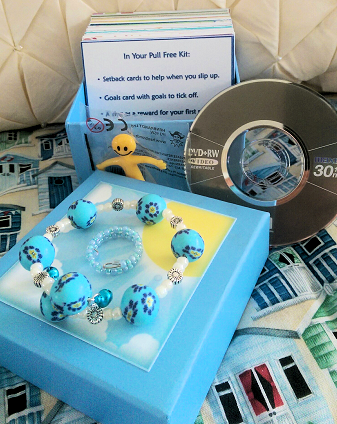Childhood Trichotillomania can be heartbreaking for both parent & child
hair pulling is a distressing disorder for children and for their parents.
With your love and our support you can help your child stop hair pulling.
If you know, or have, a hair pulling child, you must be eager to help them overcome the condition. My heart goes out to you – I know that my parents were desperate to help me stop pulling when I began at age 12 back in the 1970’s. Trichotillomania (tric) was not a recognized condition. My parents loved me dearly and my hair pulling was in no way a reflection on their parenting. Your child’s tric is not your fault. I want to congratulate you on finding this website and educating yourself. With your love and our support your child can recover.
Doesn’t hair pulling hurt?
Actually it is pleasurable, hence the problem. Hair pulling can be comforting, much like thumb sucking. The search for the right hair, the pulling action and even the examination of the detached hair are all part of a soothing ritual. Pulling can take place from the scalp, the eyelashes, the eyebrows, the arms or legs – pretty much anywhere hair grows. Pulling from the very back of the head, where the brain stem meets the spine, is unusual though.
What causes the urge to pull?
I used to pull when anxious, bored or concentrating. This means that I pulled whenever I was sedentary – while reading, studying, watching TV, on the computer or daydreaming. Some people even pull in their sleep. How strong is the urge? It becomes second nature and it is a HUGE effort not to pull. Think of tricsters as alcoholics who have a bottle attached to their head.
How can I persuade her to stop pulling?
Simply punishing your hair pulling child when she pulls will not work for long – the mounting tension will cause her to pull even more. It is essential to create a safe, trusting environment by assuring her that you love her just as she is and are there to support her. Here are some tips:
Reward success
Every day your child manages not to pull should be immediately rewarded with a sticker or toy. The level of effort required not to pull for a day, is the equivalent of passing a hard exam – think of this when selecting the size of the reward. When a setback occurs, as it inevitably will, there is no point dwelling on failure. The message is “you succeeded before and you can do it again”.
Cover the head
If your child is pulling from the scalp, hats and scarves are effective barriers and also hide the damage from pulling.
Keep the hands busy or covered
Provide alternatives for her to fiddle with: tactile toys such as squeegie balls, tangle toys, play-doh and knitting which engage fine motor skills are ideal. The key is to keep her hands busy and fool the brain. Exchange the pulling habit with beading, for example. Put coconut oil on your child before bed or keep fabric plasters (band-aids) or thumbsies on the thumbs.
Get fit with sports
It’s hard to pull if you are swimming, playing ball, climbing on the monkey bars or dancing. Plus, the endorphins generated by exercise are a proven antidote to stress.
I have tried all these things and nothing is helping. What should I do?
Time to get help. You can start by speaking to your physician or school counsellor, however not all professionals are familiar with the condition. I highly recommend the coaching.care coaches who have all overcome hair pulling, in my case they helped me become pull free after a life time of tric. These therapists have extensive experience treating children from the age of four, and can counsel your child over the phone, using skype or via email. As former hair pullers they understand first hand how your child feels.
How long will this last?
Some children just pull for a few months and the phase fades, while others like me end up pulling for decades. If you want to stop child hair pulling, let us mentor you to do this in a conflict free manner. You are doing the right thing by attending to this now. With the right help your child can conquer the condition. I wish this kind of assistance had been available when I was a youngster.
Louise




